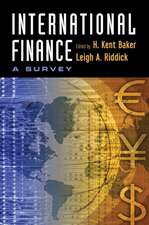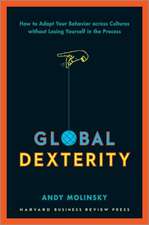Handbook of Cultural Intelligence: Theory, Measurement, and Applications
Autor Soon Ang, Linn Van Dyneen Limba Engleză Hardback – 24 iun 2009
Preț: 1126.82 lei
Preț vechi: 1374.17 lei
-18% Nou
Puncte Express: 1690
Preț estimativ în valută:
215.61€ • 225.12$ • 178.45£
215.61€ • 225.12$ • 178.45£
Carte tipărită la comandă
Livrare economică 04-18 aprilie
Preluare comenzi: 021 569.72.76
Specificații
ISBN-13: 9780765622624
ISBN-10: 0765622629
Pagini: 432
Ilustrații: tables, figures, references, index
Dimensiuni: 178 x 254 x 30 mm
Greutate: 0.96 kg
Ediția:1
Editura: Taylor & Francis
Colecția Routledge
Locul publicării:Oxford, United Kingdom
ISBN-10: 0765622629
Pagini: 432
Ilustrații: tables, figures, references, index
Dimensiuni: 178 x 254 x 30 mm
Greutate: 0.96 kg
Ediția:1
Editura: Taylor & Francis
Colecția Routledge
Locul publicării:Oxford, United Kingdom
Cuprins
Part I Introduction; Chapter 1 Conceptualization of Cultural Intelligence, Soon Ang, Linn Van Dyne; Chapter 2 Development and Validation of the CQS, Linn Van Dyne, Soon Ang, Christine Koh; Part II Extending the CQ Nomological Network; Antecedents of CQ; Chapter 3 Antecedents of the Four-Factor Model of Cultural Intelligence, Lu M. Shannon, Thomas M. Begley; Chapter 4 Developing Cultural Intelligence, Ibraiz Tarique, Riki Takeuchi; Chapter 5 Cultural Intelligence and International Assignment Effectiveness, Kwanghyun Kim, Bradley L. Kirkman, Gilad Chen; Chapter 6 Top Executives and Global Leadership, Michael J. Mannor; Chapter 7 Cultural Intelligence, Margaret Shaffer, Gloria Miller; —CO as a Mediator—; Chapter 8 Antecedents and Consequences of Cultural Intelligence Among Short-Term Business Travelers, Cheryl Tay, Mina Westman, Audrey Chia; Chapter 9 Cultural Intelligence as a Mediator of Relationships Between Openness to Experience and Adaptive Performance, Tania Oolders, Oleksandr S. Chernyshenko, Stephen Stark; Chapter 10 Personality, Cultural Intelligence, and Cross-Cultural Adaptation, Colleen Ward, Ronald Fischer; Part III CQ Applied To Multicultural Teams; Chapter 11 Cultural Intelligence and Global Identity in Multicultural Teams, Efrat Shokef, Miriam Erez; Chapter 12 The Effects of Cultural Intelligence on Team Member Acceptance and Integration in Multinational Teams, Jane E. Flaherty; Chapter 13 The Effects of Cultural Intelligence on Interpersonal Trust in Multicultural Teams, Thomas Rockstuhl, Kok-Yee Ng; Chapter 14 Culture Inside and Out, Cristina B. Gibson, Rebekah Dibble; Part IV CQ Applied Across Disciplines; Chapter 15 The Challenge of Behavioral Cultural Intelligence, Priscilla S. Rogers; Chapter 16 Cultural Intelligence in Counseling Psychology, Michael Goh, Julie M. Koch, Sandra Sanger; Chapter 17 Cultural Intelligence and Short-Term Missions, David Livermore; Part V CQ and Related Constructs; Chapter 18 Social Intelligence, Emotional Intelligence, and Cultural Intelligence, Detelin S. Elenkov, Joana R.C. Pimentel; Chapter 19 Successful Intelligence as a Framework for Understanding Cultural Adaptation, Robert J. Sternberg; Chapter 20 Navigating Cultures, Jennifer Klafehn, Preeta M. Banerjee, Chi-Yue Chiu; Chapter 21 Social Axioms and Cultural Intelligence, Kwok Leung, Fuli Li; Chapter 22 Intercultural Competence Development and Triple-Loop Cultural Learning, Dharm P.S. Bhawuk, Keith H. Sakuda, Vijayan P. Munusamy; Chapter 23 Contextualizing Cultural Intelligence, Maddy Janssens, Tineke Cappellen; Part VI Commentary; Chapter 24 Thinking Intelligently About Cultural Intelligence, Michele J. Gelfand, Lynn Imai, Ryan Fehr;
Notă biografică
Soon Ang, Linn Van Dyne, Harry C., Triandis
Descriere
Cultural intelligence is defined as an individual's ability to function effectively in situations characterized by cultural diversity. This title presents a summary of the body of knowledge about cultural intelligence and its relevance for managing diversity both within and across cultures.






